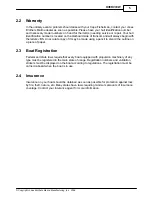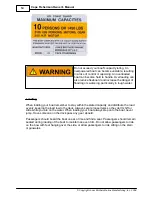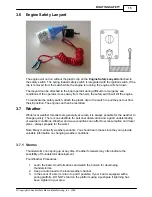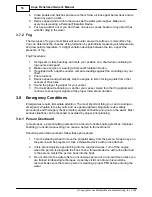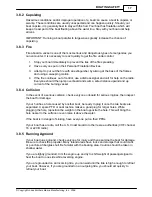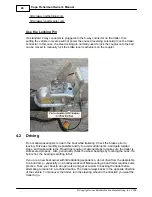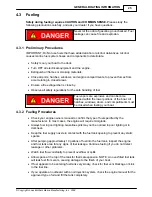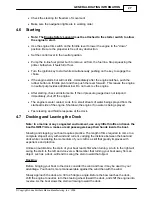
BOATING SAFETY
17
© Copyright Jones Brothers Marine Manufacturing, Inc. 2008
3.8.2 Capsizing
Hazardous conditions and/or improper operation of a boat can cause a boat to capsize or
swamp. These conditions are usually unexpected and can happen quickly. Should your
boat capsize, it is generally best to stay with the hull. Your boat has floatation which will
keep at least part of the boat floating above the water line. Stay with your boat until help
arrives.
IMPORTANT: Running a boat parallel to large waves greatly increase the chance of
capsizing.
3.8.3 Fire
Fire aboard a vessel is one of the most serious and dangerous types of emergencies you
can encounter. It is necessary to react quickly to get the fire under control.
1.
Stop your boat immediately to prevent the risk of the fire spreading.
2.
Have everyone put on their Personal Floatation Devices.
3.
Attempt to put out the fire with an extinguisher by aiming at the base of the flames
and using a sweeping motion.
4.
If the fire continues out of control, use a distress signal and call for help on the radio.
Everyone should then jump overboard and swim a safe distance upwind and up
current of the burning vessel.
3.8.4 Collision
In the event of a serious collision, check everyone onboard for serious injuries, then inspect
the boat for damage.
If your hull has a hole caused by another boat, be ready to plug it once the two boats are
separated. A spare PFD or seat cushion makes a good plug for larger holes. While
plugging the hole, reposition the weight on the boat opposite the hole. This will bring the
hole nearer to the surface or even raise it above the water.
If the boat is in danger of sinking, have everyone put on their PFDs.
If your boat has a radio, call the U.S. Coast Guard or other rescue authorities (VHF channel
16 or 22 CB radio).
3.8.5 Running Aground
If your boat runs aground, check everyone for injury and then examine the boat for damage.
Be sure to check the propeller. Many inland areas have rocks and stumps that could crack
or puncture a fiberglass hull. Be familiar with the boating area. Caution should be taken in
shallow water.
If you are lightly grounded, trim the engine up and try to shift weight of passengers/gear to
heel the boat to one side while reversing engine.
If you are grounded on an incoming tide, you can wait until the tide is high enough to refloat
your boat. However, if you are grounded on an outgoing tide, you should act quickly to
refloat your boat.
Содержание Cape Fisherman
Страница 1: ...Cape Fisherman Owner s Manual...
Страница 6: ......
Страница 7: ...WELCOME Part I...
Страница 9: ...OVERVIEW Part II...
Страница 12: ......
Страница 13: ...BOATING SAFETY Part III...
Страница 26: ......
Страница 27: ...GENERAL BOATING INFORMATION Part IV...
Страница 37: ...OPERATION Part V...
Страница 55: ...MAINTENANCE AND SERVICE Part VI...
Страница 61: ...WINTERIZATION AND STORAGE Part VII...



